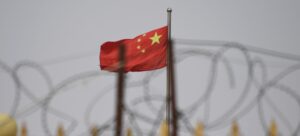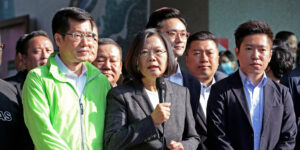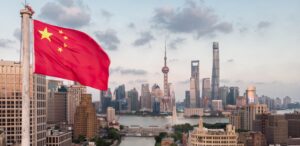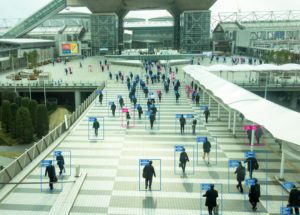January 2025, Volume 36, Issue 1
Hong Kong’s Native Son
A review of The Troublemaker: How Jimmy Lai Became a Billionaire, Hong Kong’s Greatest Dissident, and China’s Most Feared Critic, by Mark L. Clifford.
January 2025, Volume 36, Issue 1
A review of The Troublemaker: How Jimmy Lai Became a Billionaire, Hong Kong’s Greatest Dissident, and China’s Most Feared Critic, by Mark L. Clifford.


October 2024, Volume 35, Issue 4
The People’s Republic of China has entered a new age, abandoning the ideological openness of the reform era and the socialist legacy of the revolutionary period. Under Xi Jinping, regime stability trumps all — and the PRC is weaker and less stable as a result.
July 2023, Volume 34, Issue 3
Under Xi Jinping, the Chinese Communist Party has wound down local elections and reasserted control in the countryside. But putting these burdens on its own shoulders brings new and significant risks for Beijing.

April 2023, Volume 34, Issue 2
The regime’s ill-fated policy to eliminate covid from China spurred the largest protests in a generation. It also made Xi Jinping’s challenge of maintaining authoritarian control over Chinese society even harder.

October 2022, Volume 33, Issue 4
Beijing is bent on deploying mass surveillance to eliminate threats to its rule. It is terrifying—and the latest example of its determination to remold society.
July 2022, Volume 33, Issue 3
Xi Jinping undercut China’s political norms to cement his own power and brand of rule. But in so doing the “Chairman of Everything” has introduced new vulnerabilities for the regime.

July 2022, Volume 33, Issue 3
No state on the planet is more heavily targeted by authoritarians’ information warfare than the Republic of China on Taiwan. And no other state and free society are better at resisting the daily onslaught.
January 2022, Volume 33, Issue 1
With the new National Security Law, the Chinese Communist Party has honed its more sophisticated tool for hollowing out the city, whose rights and freedoms Beijing had once promised to respect.


April 2021, Volume 32, Issue 2
China’s fast economic rise has not dented its dictatorship, but Xi Jinping’s neo-Stalinist strategy has unleashed new challenges and tensions for the Communist Party’s long-term prospects for survival.
January 2021, Volume 32, Issue 1
The retirement of the country’s longest-serving prime minister leaves in place a “continuity administration,” and with it some troubling questions about whether liberal democracy’s “soft guardrails” are being eroded.
October 2020, Volume 31, Issue 4
Liberty flourished in Hong Kong, but the Chinese Communist Party has crushed it. Beijing wants “capitalism without freedom” in the city, but can there be one without the other?
July 2020, Volume 31, Issue 3
No country in the world is more intensely targeted by Beijing’s influence operations than Taiwan. The lead-up to the January 2020 elections saw China putting a full-court press on the island, but Taiwanese democracy broke it.

July 2020, Volume 31, Issue 3
Although South Korea is praised for its success at fighting covid-19, the triumph came at a cost to rights and privacy, and is drawing attention away from a larger drift toward illiberalism and bitterly factionalized politics.


April 2020, Volume 31, Issue 2
The coronavirus outbreak has exposed the corrupt and rotten core of the Chinese Communist Party’s dictatorial rule over China. It is a moment of revelation. Can it also become one that leads to change?
April 2020, Volume 31, Issue 2
Ordinary citizens in East Asia, Latin America, and Africa are increasingly disappointed with democracy and its ability to deliver.
January 2020, Volume 31, Issue 1
To grasp why post-Mao China’s remarkable economic development has not aided democracy, we must look first at the policies of top Chinese leaders.
January 2020, Volume 31, Issue 1
Why do East and Southeast Asia’s autocracies enjoy more support from their publics than do the region’s democracies?
April 2019, Volume 30, Issue 2
The Editors’ introduction to “30 Years After Tiananmen.”


April 2019, Volume 30, Issue 2
China’s 1989 democracy movement was brutally suppressed, but a former student leader argues that it also planted the seeds for the growth of Chinese civil society and for future democratization.

April 2019, Volume 30, Issue 2
Xi reads Tiananmen as a cautionary tale, and he has sought to centralize power and reverse years of ideological atrophy. By controlling the past, he is trying to determine how the Chinese will view their present and future.
April 2019, Volume 30, Issue 2
The CCP’s strategies for delivering economic and social benefits without democracy are proving deeply flawed. A particular threat to China’s stability is posed by the country’s restless single males.
April 2019, Volume 30, Issue 2
The Chinese Communist Party wields highly effective means to quash dissent, but Chinese intellectuals and interest groups continue to push for change.
April 2019, Volume 30, Issue 2
It was the impact of Tiananmen that made the democracy movement in Hong Kong a mass phenomenon. Today, the democratic cause in Hong Kong remains linked to the democratic cause in China as a whole.


January 2019, Volume 30, Issue 1
Chinese authorities are wielding facial-recognition software, big-data analytics, and other digital technologies to control China’s citizens by monitoring and assessing their activities, both online and off.
April 2018, Volume 29, Issue 2
The Editors’ introduction to “China in Xi’s ‘New Era.'”

April 2018, Volume 29, Issue 2
After Mao, Deng Xiaoping tried to institutionalize collective leadership, but this did not stop Xi Jinping from grasping all the levers of power.
April 2018, Volume 29, Issue 2
It has long been hoped that China would be integrated into the liberal world order. That particular “China dream” has ended, however, as Beijing seeks to reshape the world order, with itself at the center.
April 2018, Volume 29, Issue 2
China has emerged as a key player in development assistance, challenging the mainstream development community’s emphasis on good governance.
April 2018, Volume 29, Issue 2
Despite its tiny size, Singapore has shown that a firm stance can help to resist Chinese encroachment.
April 2018, Volume 29, Issue 2
Through its “16+1” initiative, China is building relationships with postcommunist Europe that could threaten to undermine the European Union.
April 2018, Volume 29, Issue 2
Despite current trends, Chinese thinkers friendly to human rights and liberal democracy have left behind a treasury of thought from which their country may one day draw new inspiration.
January 2018, Volume 29, Issue 1
China has seen a staggering number of official corruption cases in recent years. But does it merit the label of kleptocracy?
October 2017, Volume 28, Issue 4
After a presidential corruption scandal sparked peaceful mass protests leading to the impeachment and removal of the incumbent, South Koreans went to the polls to choose her successor. Was this drama a window on the troubles of South Korean democracy, or a testament to its strength and resilience?
October 2017, Volume 28, Issue 4
A tribute in remembrance of Liu Xiaobo (1955–2017).
July 2017, Volume 28, Issue 3
The CCP regime has lost support among three groups it should normally be able to count on: street-level police, retired military officers, and state employees who are drafted into stifling dissent on the part of their own relatives.
October 2016, Volume 27, Issue 4
Evidence from social science and history suggests that China is entering a “transition zone” that will threaten its capacity to maintain both authoritarian rule and high levels of economic growth.
October 2016, Volume 27, Issue 4
Duterte promised voters that he would swiftly reduce crime and poverty and enact constitutional change. But will he violate democratic norms and rule of law in the process?

July 2016, Volume 27, Issue 3
Far from being a reformer, as some had hoped, President Xi Jinping has launched the most sweeping ideological campaign seen in China since Mao. Xi is mixing nationalism, Leninism, and Maoism in ways that he hopes will cement continued one-party Communist rule.

April 2016, Volume 27, Issue 2
Seymour Martin Lipset argued that economic development would enlarge the middle class, and that the middle class would support democracy. To what extent will this general proposition prove true of China?

January 2016, Volume 27, Issue 1
China’s government looks to Singapore, the only country in the region to modernize without liberalizing, in hopes of finding the key to combining authoritarian rule with economic progress and “good governance.”
January 2016, Volume 27, Issue 1
Bold leadership from people in key posts can effectively promote public integrity, but they must be ready to accept tenures that are stormy and short.
October 2015, Volume 26, Issue 4
China is aggressively working to reshape its image, touting the “Chinese Dream” and its desire for a peaceful rise to power on the international stage.
July 2015, Volume 26, Issue 3
The post–post-Mao era has now begun. The reforms that brought economic growth and greater openness to China are being unwound, while an assertive new leader strikes off in a populist and nationalist direction.
April 2015, Volume 26, Issue 2
China has gone back on its well-documented vow (and solemn treaty obligation) to allow Hong Kong genuine universal suffrage. Abrogated commitments and fake democracy are not the path to a thriving Hong Kong that feels at home within the People’s Republic of China.
April 2015, Volume 26, Issue 2
The demonstrations of late 2014 captured the world’s attention with their scale, passion, and resourcefulness, but in the end were unable to move dug-in local and national authorities. Yet time is still on the side of the demonstrators.
April 2015, Volume 26, Issue 2
East Asia’s millennials have grown up in an age of rapid socioeconomic progress, allowing them to become better educated, more urbanized, and more technologically connected than previous generations. Will they use their collective power to become agents of democratic change?
January 2015, Volume 26, Issue 1
As China’s power grows, will it seek to remake the world in its authoritarian image? For now, China shows no such missionary impulse, but the ways in which it pursues its interests can still threaten the fate of democracy.
April 2013, Volume 24, Issue 2
Evidence of the evil perpetrated in North Korea’s prison camps continues to emerge, as most vividly highlighted by Blaine Harden’s Escape from Camp 14: One Man’s Remarkable Odyssey from North Korea to Freedom in the West.

January 2013, Volume 24, Issue 1
The resilience of the Chinese authoritarian regime is approaching its limits. A breakthrough moment could be triggered by several kinds of events.
January 2013, Volume 24, Issue 1
Despite the considerable resilience demonstrated by the Chinese authoritarian regime, its power experiences continuous atrophy. With the weakening of the totalitarian control imposed on Chinese society, the current stability-maintenance system has been decreasing in its effectiveness.
January 2013, Volume 24, Issue 1
There are two sharply contrasting and controversial perspectives on China’s near- to medium-term future: top-level reform and bottom-up revolution.
January 2013, Volume 24, Issue 1
China is heading toward a tipping point, with two likely scenarios for how a political opening will come about. Most Chinese intellectuals think that only gradualism—“slow and steady,” step-by-step reform—can offer China a safe and feasible path toward liberal democracy. But they are wrong. Instead of “taking it slow,” China should shun gradualism and opt…
January 2013, Volume 24, Issue 1
Although the Chinese Communist Party has tried to institutionalize the political system in the reform era, such efforts have been hampered by the Maoist legacy. To cope with challenges from the society, the CCP mainly relies on a highly centralized and resource-intensive weiwen system, and shows little respect for institutional differentiation and formal procedures.
January 2013, Volume 24, Issue 1
Over the past decade, Chinese authorities have turned against many of the legal reforms they themselves had enacted in the late 20th century. Lawyers have come under increased pressure. Political campaigns warning against rule-of-law norms have rippled through the courts. And central authorities have massively increased funding for extralegal institutions aimed at curtailing and suppressing…
January 2013, Volume 24, Issue 1
The response of the Chinese state (and of Chinese society at large) to the problems of the country’s periphery—Tibet, Xinjiang, and Inner Mongolia, as well as hundreds of counties, prefectures, and townships in Sichuan, Qinghai, Yunnan, and other areas—is piling more tension and misery upon the populations there, but it is not undermining state power.
January 2013, Volume 24, Issue 1
In recent years, Chinese netizens have shown boundless creativity and ingenuity in expressing themselves despite government restrictions on online speech. Will new political discourse give birth to a new political identity? Are new forms of networked communication enhancing opportunities for social change and helping to move China toward a “threshold” for political transformation?

January 2012, Volume 23, Issue 1
If there is going to be a great advance of democracy in this decade, it is most likely going to emanate from East Asia.
April 2005, Volume 16, Issue 2
In three of the six democracies surveyed by the East Asia Barometer, a majority of respondents prefer democracy to its alternatives. In the other three, however, a lingering nostalgia for authoritarianism stands in the way of democratic consolidation.
January 2003, Volume 14, Issue 1
Successful institutionalization will help the regime survive the pressures of advanced modernization and integration with the global economy.
January 2002, Volume 13, Issue 1
The implicit social bargain that carried many East Asian countries through the Cold War has lost its currency. If the peoples of this region are to secure the blessings of peace, liberty, and prosperity in the century ahead, they will need to have a new and explicitly democratic bargain working for them.
October 2001, Volume 12, Issue 4
In the wake of the East Asian economic crisis of 1997-98, how has the appeal to “Asian Values” fared as a rhetorical prop for undemocratic rule?
October 2000, Volume 11, Issue 4
Global trends toward economic and political liberalization are presenting East Asian and Latin American democracies with increasingly convergent international opportunities and constraints.
October 2000, Volume 11, Issue 4
Such a comparison clearly shows a higher prevalence of democracy in Latin America and a better economic performance in East Asia. The two regions are likely to converge on both dimensions, but the gaps will remain.
October 2000, Volume 11, Issue 4
Despite the persistent doomsaying about the political consequences of untrammeled international capital flows, financial liberalization may actually contribute to democratic consolidation.
April 2000, Volume 11, Issue 2
A quarter-century after the classic study The Crisis of Democracy was published, three distinguished political scientists find that, though the “crisis” may have disappeared, public confidence is on the decline in almost all the world’s advanced democracies.
April 2000, Volume 11, Issue 2
The political dimensions of the 1997-99 Asian financial crisis have been largely ignored. Yet political factors are crucial to understanding the crisis and the differing ways in which the democracies and authoritarian regimes in the region responded to it.
July 1998, Volume 9, Issue 3
A review of China’s Transition, by Andrew Nathan.
January 1998, Volume 9, Issue 1
Read the full essay here.
January 1998, Volume 9, Issue 1
Read the full essay here.
January 1998, Volume 9, Issue 1
Read the full essay here.
January 1998, Volume 9, Issue 1
Read the full essay here.
January 1998, Volume 9, Issue 1
Read the full essay here.
January 1998, Volume 9, Issue 1
Read the full essay here.
January 1998, Volume 9, Issue 1
Read the full essay here.
January 1998, Volume 9, Issue 1
Read the full essay here.
July 1997, Volume 8, Issue 3
Read the full essay here.
July 1997, Volume 8, Issue 3
Read the full essay here.
July 1997, Volume 8, Issue 3
Read the full essay here.
April 1997, Volume 8, Issue 2
The Editors’ introduction to “Hong Kong, Singapore, and ‘Asian Values.'”
April 1997, Volume 8, Issue 2
Read the full essay here.
April 1997, Volume 8, Issue 2
Read the full essay here.
July 1995, Volume 6, Issue 3
A review of From Reform to Revolution: The Demise of Communism in China and the Soviet Union, by Minxin Pei and Sowing the Seeds of Democracy in China: Political Reform in the Deng Xiaoping Era, by Merlec Goldman.
July 1994, Volume 5, Issue 3
Read the full essay here.
January 1994, Volume 5, Issue 1
Read the full essay here.